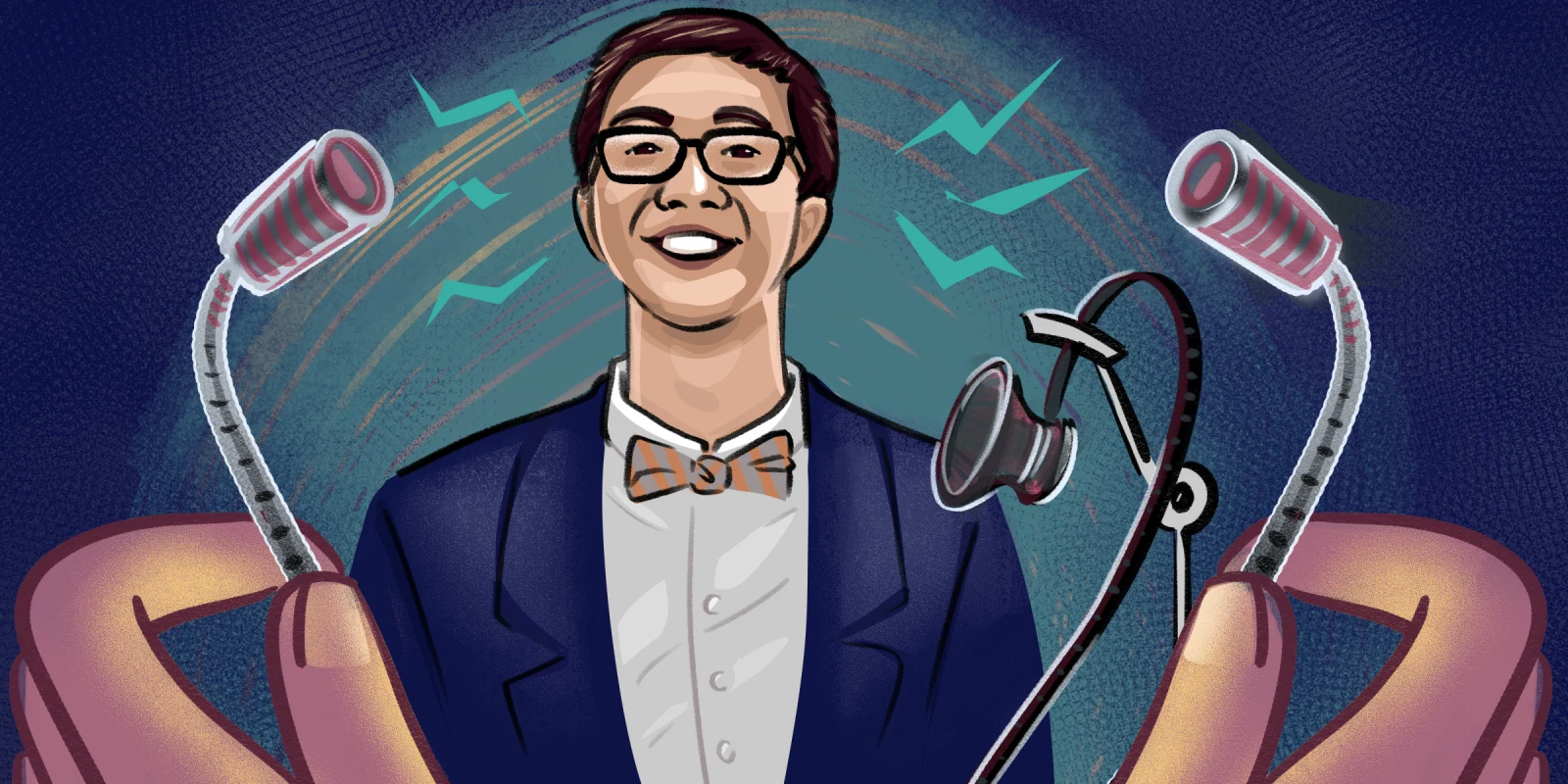I started podcasting when I entered medical school. I quickly learned that voice is what makes a podcast. A voice can give away a host’s personality by showing how they react to the people they’re interviewing, through the cadence of their speech, and with the words they choose. A voice can give someone authority, or it can show that a guest is emotional or passionate about an issue.
Because I constantly examine my voice as a podcaster, I think a lot about the voice I use with patients. I remember practicing for my first Objective Structured Clinical Examination (OSCE) as if I were auditioning for the role of a doctor in a TV show. I would make sure to greet folks with a warm, welcoming smile in my voice. I would try to keep my tone and pitch calm and even-keeled. And I would memorize and practice scripts of questions, answers, and patient-centered language.
During the day of the OSCE, of course, my voice would change. You could hear a shakiness in my voice, and I would fumble over words. As I rummaged through the filing cabinet of my brain for what question to ask next, I would pause randomly and then speed through my responses.
These past three years, I’ve been zeroing in on my own “doctor voice.” It’s better, but I’m still trying to hone it. I know that my “professional” voice is different from the one I use to speak with my friends. With patients, I’ve noticed that I’ve started to speak in a deeper pitch, at a more deliberate pace, and with minimal jargon.
In a Medical Journalism elective at my school, I took a group of students through a workshop on voice in podcasting. I tried to relate it back to medicine to get people thinking about the voices they use with their patients. I told them that reporters on NPR, hosts on Gimlet podcasts, and plenty of amateur podcasters (myself included) try to sound like people they’ve heard: Ira Glass of This American Life, Sarah Koenig of Serial, and Michael Barbaro of The Daily. Sometimes, when I imagine what my “doctor voice” sounds like, I’m influenced by the physician touchstones in popular media: Sanjay Gupta on CNN, George Clooney on ER, and Sandra Oh on Grey’s Anatomy. In professions where voice is important, you might hear folks chase after a warm, inviting timbre; a friendly, conversational tone; and an accessible, storytelling cadence. There is a colossal monolith being built, brick by brick, show by show, that heralds a certain kind of voice as the one true “voice of professionalism,” both in podcasting and in medicine. I told that group of students: That monument should come down. We need much greater diversity in physician voices.
Many of the students in the workshop, imagining themselves as physicians, agreed. One of them said that having vocal fry or a higher-pitch voice makes some women feel that their voice doesn’t sound like that of a reporter, host, or physician – that they have to change it to avoid sounding “unprofessional.”
But if we had to start over, what should we say makes up a “professional” voice? Does it end assertions with upspeak, as if you’re asking a question? Does it have accents from the South, or the valley, or a country near or far? Does it sound young or old?
The first OSCE I completed was recorded. When I played it back, I listened to it by myself, at low volume, feeling shame at the sound of my own voice. I thought, That’s how I really sound? So when I started podcasting soon after, I adjusted my voice, deepened it, and channeled other people’s voices.
Over time, I realized that it took too much time and energy to sound like someone else. I have nasality in my voice, the occasional monotone, and my own pitch. If I don’t believe there is a true “professional” voice in podcasting or medicine, why shouldn’t I believe that my voice is professional too?
These days, I don’t worry as much when I have to press record, or when I go to meet a patient. Voice is not all that makes the doctor: Knowledge, skills, and bedside manner are critical components.
In the end, a "doctor voice" should relate to and be accessible by a patient. If we can use our voices to properly empathize, convey meaning, connect with our patients, and make them feel safe, seen, and heard, then that is the only standard for a "professional”-sounding voice that truly matters.
What do you think a doctor is supposed to sound like? Share who you emulate in the comments.
Amador (“Tino”) Delamerced is a medical student at the Warren Alpert Medical School of Brown University. He is the producer of Firsts, a podcast series about first-time experiences during medical training. Tino is a 2021–2022 Doximity Op-Med Fellow.
Illustration by April Brust





